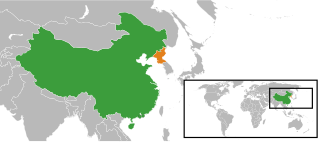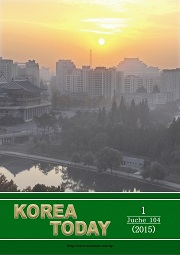
North Korea has diplomatic relations with 160 states. The country's foreign relations have been dominated by its conflict with South Korea and its historical ties to the Soviet Union. Both the government of North Korea and the government of South Korea claim to be the sole legitimate government of the whole of Korea. The de facto end of the Korean War left North Korea in a military confrontation with South Korea along the Korean Demilitarized Zone.

The Central Bank of the Democratic People's Republic of Korea is North Korea's central bank. Established on December 6, 1947, it issues the North Korean wŏn. The Bank is subordinated to the Cabinet of North Korea. Since 2023, the president of the bank has been Paek Min Gwang.
The Rason Special Economic Zone, earlier called the Rajin-Sonbong Economic Special Zone, was established in the early 1990s by the North Korean government near Rason to promote economic growth through foreign investment. It is similar to the Special Economic Zones set up by the People's Republic of China and elsewhere to pilot market economics in a designated controlled area. It is near the border with China and Russia and is a warm-water port for both countries.

The bilateral relations between the People's Republic of China (PRC) and the Democratic People's Republic of Korea (DPRK) have been generally friendly, although they were sometimes strained in recent years because of North Korea's nuclear program. They have a close special relationship and China is often considered to be North Korea's closest ally. China and North Korea have a mutual aid and co-operation treaty, signed in 1961, which is currently the only defense treaty either country has with any nation.

Hungary–North Korea relations (Korean: 마쟈르-조선민주주의인민공화국 관계) are foreign relations between Hungary and Democratic People's Republic of Korea (DPRK), commonly known as North Korea. Relations between the two countries existed since the Korean War, but however have evolved into conflicts.

Poland–North Korean relations are foreign relations between Poland and North Korea.

Postage stamps are issued by the Korea Stamp Corporation. North Korea issues copious amounts of stamps. Since the 1970s, the country has outproduced South Korea in terms of issuance. The stamps tend to portray patriotic and nationalist themes and are used as a form of propaganda, but some of them have little connection with the country. The country has been a member of the Fédération Internationale de Philatélie since 15 June 1965. There is a museum, the Korea Stamp Museum, dedicated to philately in the country.

Denmark–North Korea relations refers to the current and historical relations between Denmark and Democratic People's Republic of Korea (DPRK), commonly known as North Korea. Denmark is represented in the DPRK, through its embassy in Beijing, China. The DPRK is represented in Denmark, through its embassy in Stockholm, Sweden. Denmark supports the efforts to get North Korea back to the six-party talks. In October 2020, a documentary by Mads Brügger about Ulrich Larsen - The Mole, a Danish chef who infiltrated North Korea for 10 years in the documentary The Mole: Undercover in North Korea.

India–North Korea relations, also called Indian-North Korean relations or Indo-North Korean relations, are the bilateral relations between India and North Korea. Both countries have growing trade and diplomatic relations. India maintains an embassy in Pyongyang, and North Korea has an embassy in New Delhi.

The North Korea–Philippines relations relates to the diplomatic relationship of the Democratic People's Republic of Korea and the Republic of the Philippines.

Indonesia–North Korea relations refers to bilateral relations between Indonesia and North Korea. The two countries established diplomatic relations in 1961. Indonesia is one of the very few countries that still tries to maintain cordial relations with North Korea, despite the widespread international sanctions and resulting isolation imposed on North Korea, compounded with the negative reputation of its human rights, nuclear weapons and ballistic missile programs and Indonesia's publicly more robust engagement and partnership with South Korea.

The alleged illicit activities of the North Korean state include manufacture and sale of illegal drugs, the manufacture and sale of counterfeit consumer goods, human trafficking, arms trafficking, wildlife trafficking, counterfeiting currency, terrorism, and other areas. It is alleged many of these activities are undertaken at the direction and under the control of the North Korean government and the ruling Workers' Party of Korea, with their proceeds going towards advancing the country's nuclear and conventional arms production, funding the lifestyles of the country's elite, and propping up the North Korean economy.

North Korea–Singapore relations are bilateral relations between North Korea and Singapore.

Korea Today, first published as New Korea, is a North Korean propaganda magazine published monthly by the Foreign Languages Publishing House in Pyongyang.

Tobacco smoking is popular in North Korea and culturally acceptable among men, but not for women. As of 2014, some 45% of men are reported to smoke daily, whilst in contrast only 2.5% of women smoke daily, with most of these being older women from rural areas. Smoking is a leading cause of death in North Korea, and as of 2010 mortality figures indicate that 34% of men and 22% of women die due to smoking-related causes, the highest mortality figures in the world. There are tobacco control programs in North Korea, and although smoking was not prohibited in all public spaces, the smoking rates have declined since their peak in the 2000s.
A number of countries and international bodies have imposed international sanctions against North Korea. Currently, many sanctions are concerned with North Korea's nuclear weapons program and were imposed after its first nuclear test in 2006.

Egypt–North Korea relations refer to the bilateral relations between Egypt and North Korea. Egypt has an embassy in Pyongyang whilst North Korea has an embassy in Cairo.

European Union–North Korea relations are the foreign relations between the European Union and the country of North Korea. Bilateral relations between North Korea and the EU date back to the 1990s.

Ghana and North Korea established diplomatic relations in 1964.
















